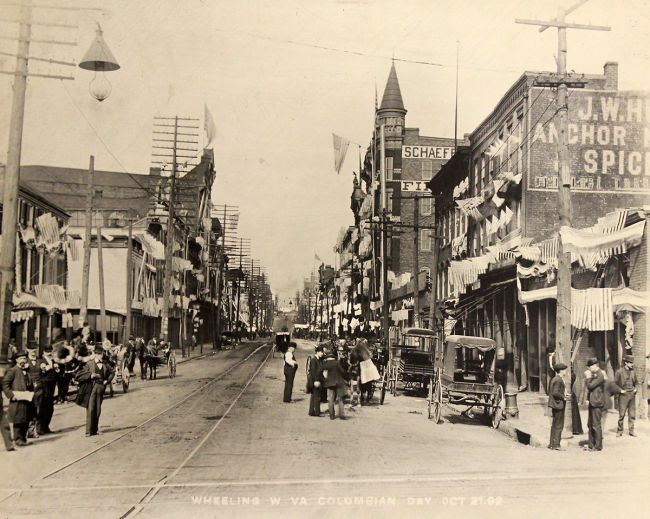On October 21, 1892, The Columbian Day parade started at 2:00 pm from Fourteenth and Market streets. Work was still underway the day before to build floats and arches for the parade. Costumes and fireworks arrived on schedule. Orators and guests have been selected.
The chief marshal, J.A. Miller, and division marshals met the night before to plan details. Miller planned to set up headquarters at the library. Groups planned to gather at assigned streets to join the parade. There was concern about getting floats down the hilly streets but they still attempted it.
The parade order and groups are described in detail, including bands, military groups, schools, societies, political clubs, trades groups, and more. Specific groups named include the Linsly Cadets, Companies F & G of the WV National Guard, patriotic societies, Cathedral Young Men's Society, glass workers and railroad workers. Marshals leading each division are named, such as George S. Feeney, W.H. Travis, B. Bach, H.B. Baguley, W.T. Otto, Frank Gruse, Hugh Sterling, and M.A. Shrebe.
The route involves several streets including Fourteenth, Market, Main, Eleventh, Twelfth. Originally they considered alternate routes to avoid the steep Main Street hill but decided to take the risk.
The Columbian Day parades, held on October 21, 1892, in many U.S. cities, commemorated the 400th anniversary of Christopher Columbus's voyage to the New World. Part of the dedication ceremonies for the World's Columbian Exposition in Chicago, the parades, though preceding the fair's official opening on May 1, 1893, honored Columbus's legacy. These celebrations served as a patriotic and diverse display, bringing together millions of Americans from various backgrounds to celebrate their common identity. The parades also showcased the progress and innovations of the late nineteenth century, reflecting a nation recovering from the Civil War and expressing its aspirations for exploration, discovery, and expansion.
Celebrating Columbus Day in recent years has become a contentious issue due to increased awareness of Christopher Columbus's atrocities against indigenous peoples. Many find celebrating the day insensitive, leading some states and cities to replace it with Indigenous Peoples' Day, honoring Native American contributions.
(https://tinyurl.com/yeyt6kn4) (https://tinyurl.com/3fv7wphc) (https://tinyurl.com/5a7yz6hk)


 RSS Feed
RSS Feed
